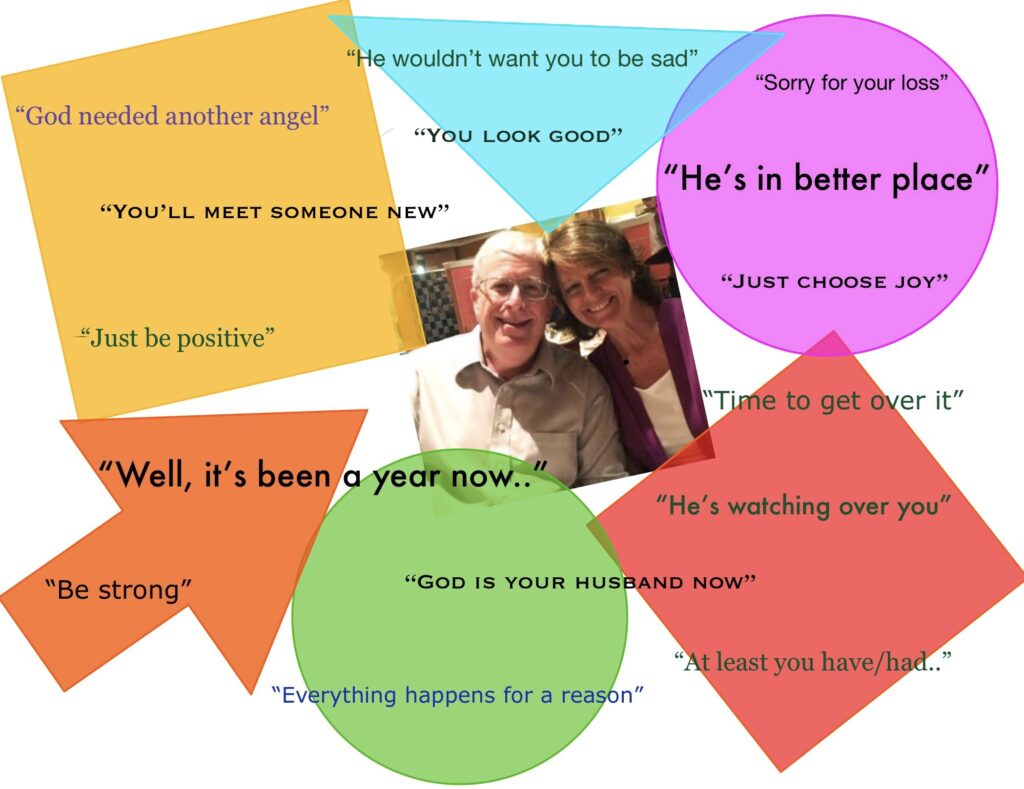So what are grief-isms and why do I think it’s essential to talk/write about this?
Grief-isms are a term I created to describe the cliched sayings we use when someone experiences a profound death loss. Most of these axioms I found unhelpful, non-comforting and sometimes annoying, especially in the early days and months of my experience.
 At first I thought I might be a bit crazy but after talking to many people who have had significant loss, especially of a close relationship – spouse, child, parent, sibling, best friend – attending GriefShare group multiple times and following several internet based widowed, grief and loss groups the past several years, I realize I‘m not alone in this opinion.
At first I thought I might be a bit crazy but after talking to many people who have had significant loss, especially of a close relationship – spouse, child, parent, sibling, best friend – attending GriefShare group multiple times and following several internet based widowed, grief and loss groups the past several years, I realize I‘m not alone in this opinion.
First of all, not one of us can fully understand death grief, especially early stage, until it’s experienced. And no one knows how they’ll react in it until it happens to them. I‘ve compared it to someone telling me how to labor and deliver a child to actually doing it. There’s knowledge of what it might be like, then there’s being up to your eyebrows in the middle of it. It’s overwhelmingly intense and painful! And you gals who’ve had a baby or two know exactly what I mean.
It’s extremely important to know how intimacy and closeness drive the level of grief when trying to support someone through a loss. The depth and duration of grief is equal to the intimacy and duration of the relationship you, your friend or family member had with the person who has died. They will grieve harder and longer for a child, spouse or family member, than an acquaintance or non-immediate family member rarely seen.
Also important to understand, is how intense grief effects lessen with time but never totally disappear and anything can trigger a fresh but (probably) shorter response. There is no proper time frame for a person to ‘get over’ a person who has died and ‘move on’. These are also cliched terms that should always be avoided.
All the love, investment and history you have for and with a person doesn’t fade out or shut off once they’re gone. Like I keep saying, There’s No Off Switch! Our people become an intricate part of us and have shaped who and what we are. Forty two years of life with my late husband and four years without him is a no win comparison and I can’t just move on to a happy, slappy brand new life as if he never existed, once the memorial service is over or the headstone is on the grave.
I‘m not here to demoralize or criticize any of us. No one wants grief education. Who in the world volunteers to join the ‘someone I love with all my heart has just died’ club? We don’t like talking or thinking about being without our best people. I get that. Since Mike was a pastor I was exposed to death, funerals, burials and the depths of human sorrow more than most. I realize now I was often just as clueless as anyone, in the face of another’s suffering and said some of these same cliched statements to people in their loss. I openly apologize to you if you were one of these people and hope you can forgive my previous ignorance.
If we all live long enough, we and others around us will likely loose someone dearly loved, so it’s crucial to practice being good comforters, to know how to be with another in their deepest pain.
The purpose of the blog posts that follow is to share my heart around some of these specific grief-isms and why they weren’t helpful. I pray this information will help all of us be better supporters of the grieving when the need arises.
Coming up next: Grief-ism #1, “He would want you to be happy.”

Never to late to learn truths about these grief-isms. Thank you for sharing your heart and your pain.